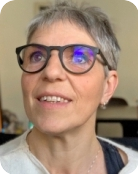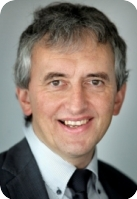Keynotes at DATE 2022
Keynote 1  |
Keynote 2  |
Keynote 3  |
Keynote 4  |
Keynote 5  |
| Keynote 1 | What is beyond AI? Societal Opportunities and Electronic Design Automation |
| Speaker | Valeria Bertacco University of Michigan Ann Arbor, United States |
Abstract
The success of hardware in enabling AI acceleration and broadening its scope has been nothing short of remarkable. How do we use the power of hardware design and electronic design automation to instead make the world a better place? EDA will be the cornerstone of innovative solutions in ensuring data privacy, sustainable computing and taming the data flood.
Biography

Valeria Bertacco is Thurnau Professor of Computer Science and Engineering at the University of Michigan, and Adjunct Professor of Computer Engineering at the Addis Ababa Institute of Technology. Her research interests are in the area of computer design, with emphasis on specialized architecture solutions and design viability, in particular reliability, validation, and hardware-security assurance. Her research endeavors are supported by the Applications Driving Architectures (ADA) Research Center, which Valeria directs. The ADA Center, sponsored by a consortium of semiconductor companies, has the goal of reigniting computing systems design and innovation for the 2030-2040s decades, through specialized heterogeneity, domain-specific language abstractions, and new silicon devices that show benefit to applications.
Valeria joined the University of Michigan in 2003. She currently serves as the Vice Provost for Engaged Learning at the University of Michigan, supporting all co-curricular engagements and international partnerships for the institution, and facilitating the work of several central units, whose goals range from promoting environmental sustainability, to the promotion of the arts in research universities, and to increasing the participation of gender minorities in the academy.
| Keynote 2 | Cryo-CMOS Quantum Control: from a Wild Idea to Working Silicon |
| Speaker | Edoardo Charbon EPFL, Switzerland |
Abstract
The core of a quantum processor is generally an array of qubits that need to be controlled and read out by a classical processor. This processor operates on the qubits with nanosecond latency, several millions of times per second, with tight constraints on noise and power. This is due to the extremely weak signals involved in the process that require highly sensitive circuits and systems, along with very precise timing capability. We advocate the use of CMOS technologies to achieve these goals, whereas the circuits will be operated at deep-cryogenic temperatures. We believe that these circuits, collectively known as cryo-CMOS control, will make future qubit arrays scalable, enabling a faster growth in qubit count. In the lecture, the challenges of designing and operating complex circuits and systems at 4K and below will be outlined, along with preliminary results achieved in the control and read-out of qubits by ad hoc integrated circuits that were optimized to operate at low power in these conditions. The talk will conclude with a perspective on the field and its trends.
Biography

Edoardo Charbon (SM'00 F'17) received the Diploma from ETH Zurich, the M.S. from the University of California at San Diego, and the Ph.D. from the University of California at Berkeley in 1988, 1991, and 1995, respectively, all in electrical engineering and EECS. He has consulted with numerous organizations, including Bosch, X-Fab, Texas Instruments, Maxim, Sony, Agilent, and the Carlyle Group. He was with Cadence Design Systems from 1995 to 2000, where he was the Architect of the company's initiative on information hiding for intellectual property protection. In 2000, he joined Canesta Inc., as the Chief Architect, where he led the development of wireless 3-D CMOS image sensors. Since 2002 he has been a member of the faculty of EPFL. From 2008 to 2016 he was with Delft University of Technology's as full professor and Chair of VLSI design. He has been the driving force behind the creation of deep-submicron CMOS SPAD technology, which is mass-produced since 2015 and is present in telemeters, proximity sensors, and medical diagnostics tools. His interests span from 3-D vision, LiDAR, FLIM, FCS, NIROT to super-resolution microscopy, time-resolved Raman spectroscopy, and cryo-CMOS circuits and systems for quantum computing. He has authored or co-authored over 400 papers and two books, and he holds 23 patents. Dr. Charbon is a distinguished visiting scholar of the W. M. Keck Institute for Space at Caltech, a fellow of the Kavli Institute of Nanoscience Delft, a distinguished lecturer of the IEEE Photonics Society, and a fellow of the IEEE.
| Keynote 3 | Batteries: Powering up the Next Generations |
| Speaker | Silvia Bodoardo Politecnico di Torino, Italy |
Abstract
The quest for energy possibly from renewable sources is rapidly increasing, due to new digital technologies that are taking up more and more space in our lives, electric vehicles expected to replace old combustion ones. However, today's battery technology is lagging behind adjacent technological advances, with most devices using lithium-ion batteries, that bring with them some concerns and not the least their availability in Europe. To create a European energy platform for the future, bringing together renewable energy sources, electric transportation and a connected Internet of Things, a new solution for battery technology needs to be found.
This keynote will explore how current challenges can be overcome through the application of advances in new materials, what is Europe doing in the field of batteries, the need of skilled people and how the future of battery technology can contribute to build a better, greener and connected world.
Biography

Silvia Bodoardo is professor at Politecnico di Torino where she is responsible for the task force on batteries and leads the Electrochemistry Group@Polito. Her research activity is mainly focused on the study of materials for Li-ion and post Li-ion batteries. The research is also dealing with cells production and battery testing. She is participating in several EU funded projects (coordinator of STABLE project), as well as national and regional ones. She is leader of WP3 on Education in Battery2030+ initiative and is co-chair in WG3 of BatteRIesEurope. Silvia organized many conferences and workshops on materials with electrochemical application and was Chair woman at the launch of the Horizon Prize on Innovative Batteries.
| Keynote 4 | AI in the Edge; the Edge of AI |
| Speaker | Georges Gielen University of Leuven, Belgium |
Abstract
In the world of IoT, both humans and objects are continuously connected, collecting and communicating data, in a rising number of applications including industry 4.0, biomedical, environmental monitoring, smart houses and offices. Local computation in the edge has become a necessity to limit data traffic. Additionally embedding AI processing in the edge adds potentially high levels of smart autonomy to these IoT 2.0 systems. Progress in nanoelectronic technology allows to do this in power- and hardware-efficient architectures and designs. This keynote gives an overview of key solutions, but also describes main limitations and risks, exploring the edge of edge AI.
Biography

Georges G.E. Gielen received the MSc and PhD degrees in Electrical Engineering from the Katholieke Universiteit Leuven (KU Leuven), Belgium, in 1986 and 1990, respectively. He currently is Full Professor in the MICAS research division at the Department of Electrical Engineering (ESAT) at KU Leuven. From August 2013 till July 2017 he was also appointed at KU Leuven as Vice-Rector for the Group of Sciences, Engineering and Technology, and he was also responsible for academic Human Resource Management. He was visiting professor in UC Berkeley and Stanford University. Since 2020 he is Chair of the Department of Electrical Engineering.
His research interests are in the design of analog and mixed-signal integrated circuits, and especially in analog and mixed-signal CAD tools and design automation. He is a frequently invited speaker/lecturer and coordinator/partner of several (industrial) research projects in this area, including several European projects. He has (co-)authored 10 books and more than 600 papers in edited books, international journals and conference proceedings. He is a 1997 Laureate of the Belgian Royal Academy of Sciences, Literature and Arts in the discipline of Engineering. He is Fellow of the IEEE since 2002, and received the IEEE CAS Mac Van Valkenburg award in 2015 and the IEEE CAS Charles Desoer award in 2020. He is an elected member of the Academia Europaea.
| Keynote 5 | Probabilistic and Deep Learning Techniques for Robot Navigation and Automated Driving |
| Speaker | Wolfgang Burgard University of Freiburg, Germany |
Abstract
For autonomous robots and automated driving, the capability to robustly perceive environments and execute their actions is the ultimate goal. The key challenge is that no sensors and actuators are perfect, which means that robots and cars need the ability to properly deal with the resulting uncertainty. In this presentation, I will introduce the probabilistic approach to robotics, which provides a rigorous statistical methodology to deal with state estimation problems. I will furthermore discuss how this approach can be extended using state-of-the-art technology from machine learning to deal with complex and changing real-world environments.
Biography

Wolfram Burgard is a Professor of Computer Science at the University of Freiburg where he heads the Laboratory for Autonomous Intelligent Systems. His interests lie in Robotics, Artificial Intelligence, Machine Learning, and Computer Vision. He has published over 400 publications, more than 15 of which received best paper awards. In 2009, he was awarded the Gottfried Wilhelm Leibniz Prize, the most prestigious German research award. In 2010, he received an Advanced Grant from the European Research Council. In 2021, he received the IEEE Technical Field Award for Robotics and Automation. He is a Fellow of the IEEE, the AAAI, the EurAI, and a member of the German Academy of Sciences Leopoldina as well as of the Heidelberg Academy of Sciences and Humanities.

